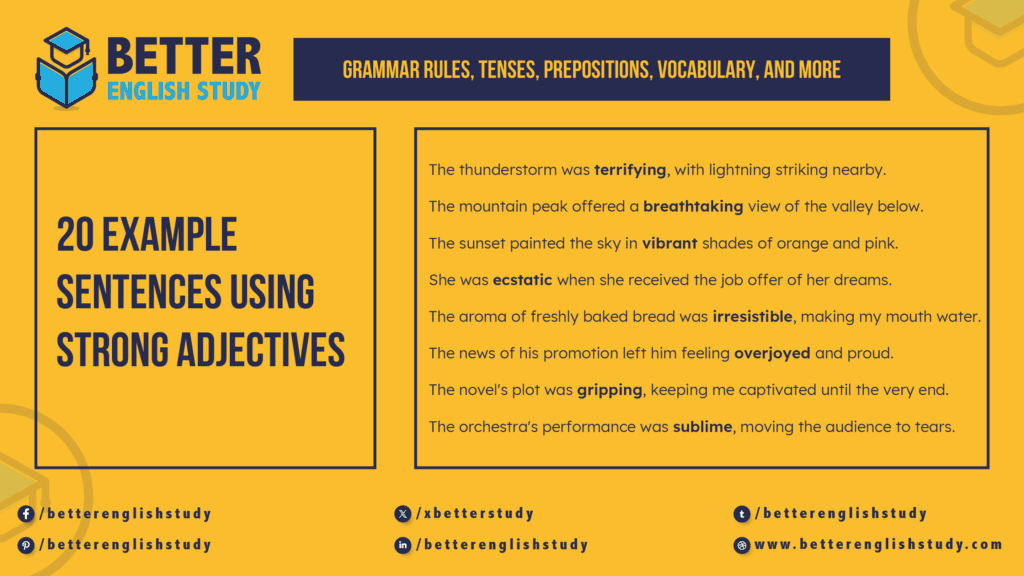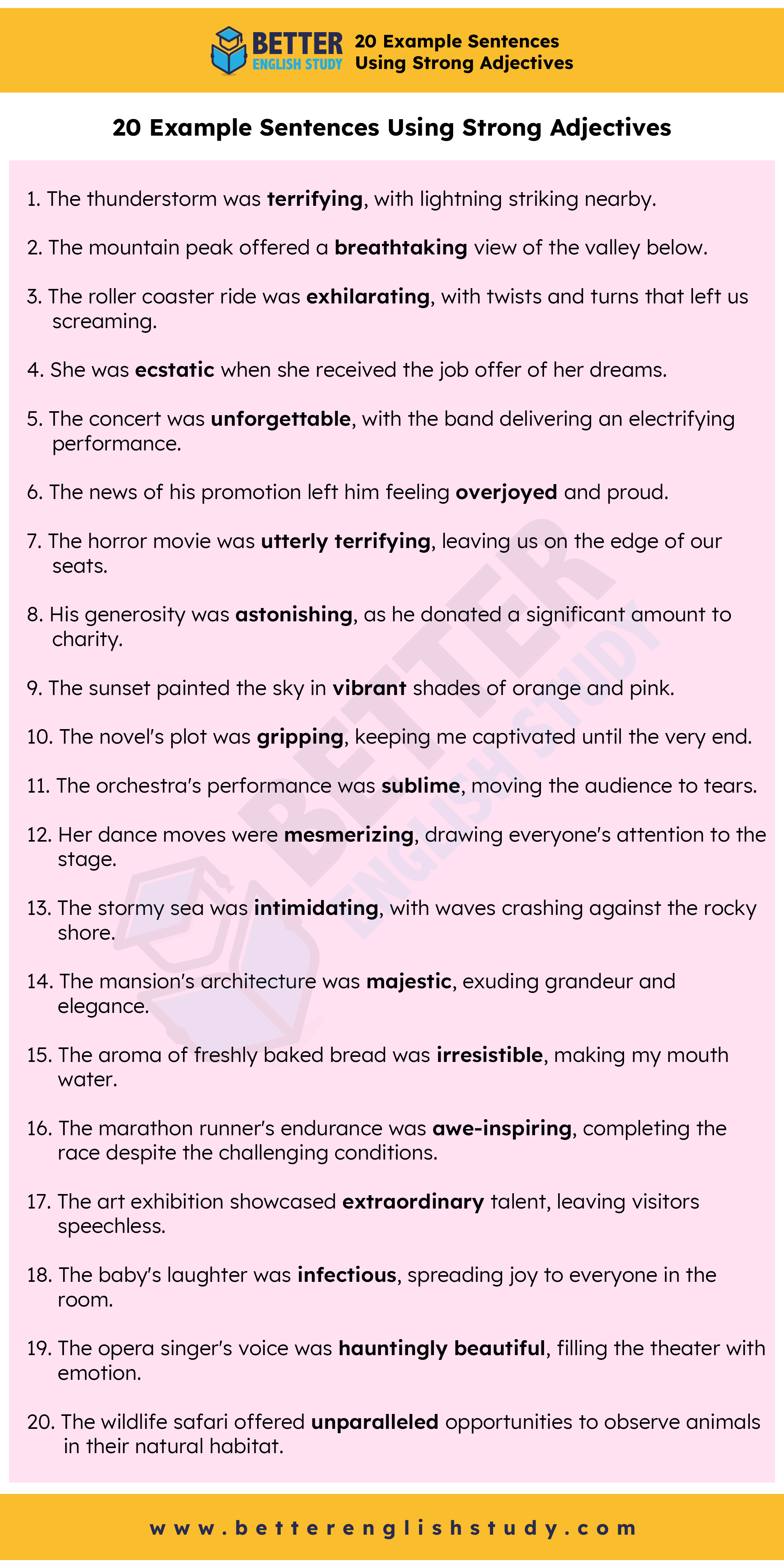
Adjectives are essential in English, providing vivid descriptions and adding depth to our communication. Among them, strong adjectives stand out for their ability to convey powerful and intense meanings. Understanding and using strong adjectives can significantly enhance your writing and speaking skills, making your expressions more impactful and engaging.
What Are Strong Adjectives?
Strong adjectives, also known as extreme adjectives, are adjectives that express an extreme or heightened degree of quality. They go beyond regular adjectives to provide a more intense description.
For example, instead of saying “very big,” you might say “huge.” Strong adjectives are often used to avoid redundancy and to create more vivid and precise descriptions.
Examples of Strong Adjectives
Here are some common strong adjectives and their corresponding regular adjectives:
- Big: huge, enormous
- Small: tiny, minuscule
- Good: excellent, superb
- Bad: terrible, awful
- Tired: exhausted
- Happy: ecstatic, thrilled
- Sad: devastated
- Hungry: starving
- Scared: terrified
- Cold: freezing
Why Use Strong Adjectives?
Using strong adjectives can make your language more dynamic and expressive. They help to avoid overusing modifiers like “very” or “really” and can make your descriptions more precise. For instance, saying “freezing” instead of “very cold” immediately gives a clearer, stronger image of the temperature.
How to Use Strong Adjectives in Sentences
Using strong adjectives correctly involves substituting regular adjectives with their stronger counterparts to convey a more intense meaning. Here are some examples:
1. Big vs. Huge/Enormous
- Regular adjective: “The building is very big.”
- Strong adjective: “The building is enormous.”
2. Small vs. Tiny/Minuscule
- Regular adjective: “The insect is very small.”
- Strong adjective: “The insect is tiny.”
3. Good vs. Excellent/Superb
- Regular adjective: “Her performance was very good.”
- Strong adjective: “Her performance was excellent.”
4. Bad vs. Terrible/Awful
- Regular adjective: “The weather is very bad.”
- Strong adjective: “The weather is awful.”
5. Tired vs. Exhausted
- Regular adjective: “He was very tired after the race.”
- Strong adjective: “He was exhausted after the race.”
20 Example Sentences Using Strong Adjectives
- The thunderstorm was terrifying, with lightning striking nearby.
- The mountain peak offered a breathtaking view of the valley below.
- The roller coaster ride was exhilarating, with twists and turns that left us screaming.
- She was ecstatic when she received the job offer of her dreams.
- The concert was unforgettable, with the band delivering an electrifying performance.
- The news of his promotion left him feeling overjoyed and proud.
- The horror movie was utterly terrifying, leaving us on the edge of our seats.
- His generosity was astonishing, as he donated a significant amount to charity.
- The sunset painted the sky in vibrant shades of orange and pink.
- The novel’s plot was gripping, keeping me captivated until the very end.
- The orchestra’s performance was sublime, moving the audience to tears.
- Her dance moves were mesmerizing, drawing everyone’s attention to the stage.
- The stormy sea was intimidating, with waves crashing against the rocky shore.
- The mansion’s architecture was majestic, exuding grandeur and elegance.
- The aroma of freshly baked bread was irresistible, making my mouth water.
- The marathon runner’s endurance was awe-inspiring, completing the race despite the challenging conditions.
- The art exhibition showcased extraordinary talent, leaving visitors speechless.
- The baby’s laughter was infectious, spreading joy to everyone in the room.
- The opera singer’s voice was hauntingly beautiful, filling the theater with emotion.
- The wildlife safari offered unparalleled opportunities to observe animals in their natural habitat.
Common Mistakes and Tips
1. Overusing Strong Adjectives
While strong adjectives are powerful, using too many in a single piece of writing can be overwhelming. Balance is key.
Tip: Use strong adjectives sparingly for maximum impact.
2. Misplacing Strong Adjectives
Ensure that the context matches the intensity of the strong adjective used.
Incorrect: She felt ecstatic about the sandwich.
Correct: She felt ecstatic about winning the competition.
3. Mixing Regular and Strong Adjectives Incorrectly
Avoid redundancy by not combining regular and strong adjectives unnecessarily.
Incorrect: The building is very enormous.
Correct: The building is enormous.

Practice with Strong Adjectives
To get comfortable with strong adjectives, try replacing regular adjectives with strong ones in your sentences. Here are some exercises:
Fill in the Blanks
- The movie was _ (very good). (Answer: excellent)
- The child was _ (very happy) on his birthday. (Answer: ecstatic)
- The hike left them _ (very tired). (Answer: exhausted)
- The soup was _ (very hot). (Answer: boiling)
- The desert was _ (very dry). (Answer: parched)
Strong adjectives are a powerful tool in English, enhancing your ability to describe and emphasize with precision and intensity. By incorporating them into your vocabulary, you can make your communication more effective and engaging. Practice using strong adjectives to replace common phrases and elevate your language skills.
FAQs about Strong Adjectives
What are strong adjectives?
Strong adjectives express an extreme or heightened degree of quality, providing more intense descriptions than regular adjectives.
How do strong adjectives differ from regular adjectives?
Strong adjectives replace phrases like “very” or “really” followed by a regular adjective. For example, instead of “very cold,” you would use “freezing.”
Can strong adjectives be used in formal writing?
Yes, strong adjectives can be used in formal writing to convey precise and impactful descriptions. However, they should be used judiciously to maintain clarity and effectiveness.
Are there strong adjectives for all regular adjectives?
Not all regular adjectives have strong counterparts, but many common ones do. It is important to learn and practice using those that do to enhance your vocabulary.
How can I practice using strong adjectives?
Practice by replacing regular adjectives in your sentences with strong adjectives. Reading widely and noting the use of strong adjectives in various texts can also help.
Mastering strong adjectives can significantly improve your descriptive abilities in English, making your expressions more vivid and engaging. Start incorporating them into your language today and experience the difference they can make.
